-------------------------------------------------------------------------------------------------------------------------------------------
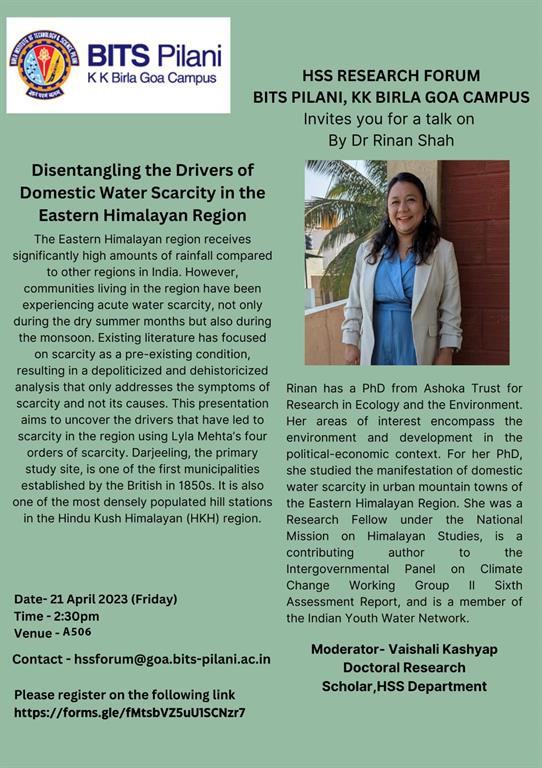
-------------------------------------------------------------------------------------------------------------------------------------------
"Care Ethics and Social Science Research"
Talk by Prof. Maurice Hamington, Department of Philosophy, Portland State University, Oregon, USA.
DATE: 14th April,2023 VENUE: ONLINE TIME: 9:00 AM onwards
Abstract
Traditional approaches to morality appear inadequate to confront contemporary social and political challenges. This presentation explores how care theory,
framed as an embodied, ethical way of being, offers new methods for thinking about morality. Such an approach has ontological, epistemological, and aesthetic significance in addition to its ethical importance. Care theory is a radical
departure from traditional moral theories.
In this presentation, care ethics is defined as a process morality whereby the journey is as important as the destination. What constitutes good care is discussed as humble inquiry, inclusive connection, and responsive action. Such a
process morality has implications for how qualitative social science research is conducted. Care is indeed knowledge work that values both generalized and concrete forms of understanding, including propositional and tacit sources of
knowledge. Rather than human subjects to be studied, the care approach emphasizes co-created research that blurs the hierarchy between the observer
and the observed. Research conducted through an ethos of care employs a methodology that is responsive, participatory, and democratic.
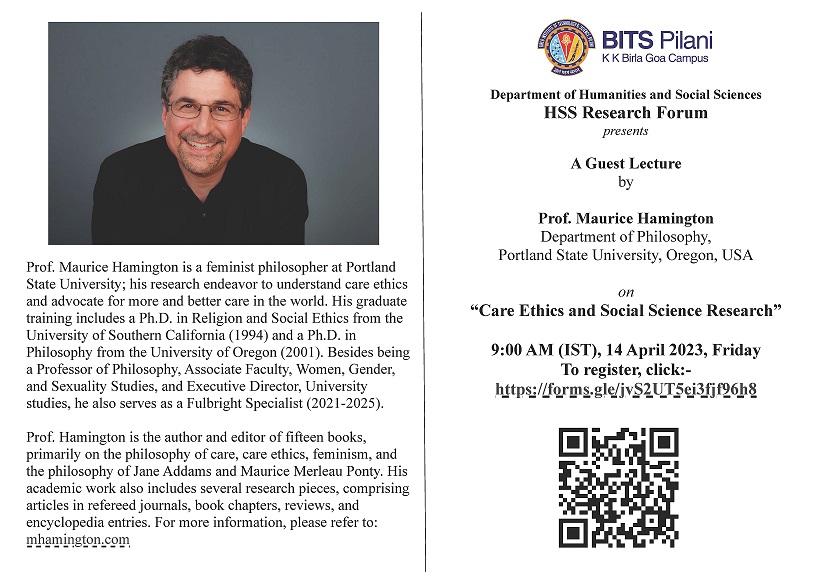
--------------------------------------------------------------------------------------------------------------------------------------------
"Queer Experiences in Workspaces"
Talk by Naman Bharti.
DATE: 6th April,2023 VENUE:A - 504, BITS Pilani K K Birla Goa Campus TIME: 4:00 PM onwards
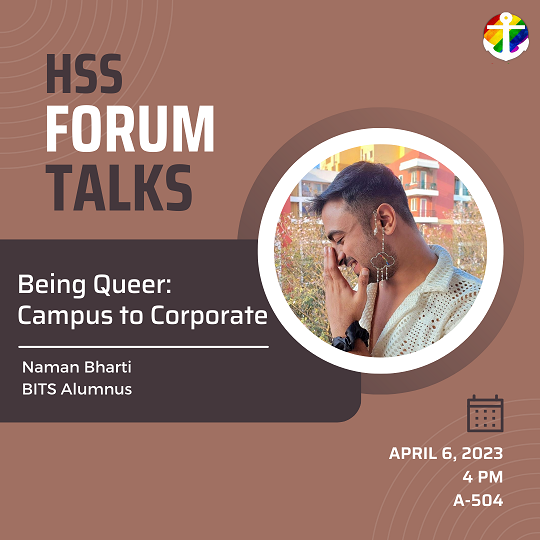

-----------------------------------------------------------------------------------------------------------------------------------------
"Corpus Regina: 'Sovereign Plasticity' and the Begum's Body politics"
Talk by Ms. Annie Treesa Joseph.
DATE: 24th March,2023 VENUE:TP classroom, BITS Pilani K K Birla Goa Campus TIME: 3:00 PM onwards
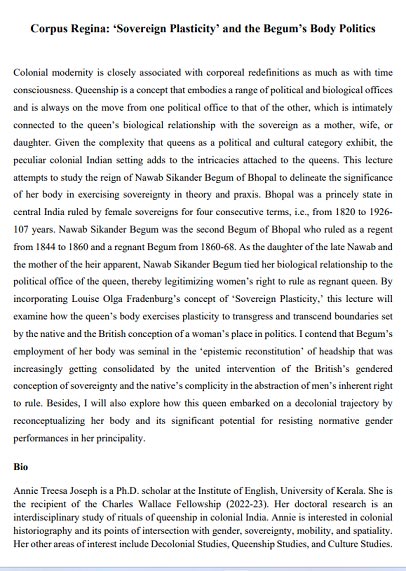
----------------------------------------------------------------------------------------------------------------------------------------
"Building the Pamban Railway Bridge (1914) or how the British empire manipulated the legend of the Ram Setu"
Talk by Dr. Arup K. Chatterjee is Professor of English, at the Jindal Global Law School, OP Jindal Global University. He is the Founder & Chief Editor of
Coldnoon: International Journal of Travel Writing & Travelling Cultures. He is also the author of, the widely reviewed and acclaimed, The Purveyors of Destiny: A Cultural Biography of the Indian Railways (2017), The Great
Indian Railways (2018), Indians in London: From the Birth of East India Company to Independent India (2021) and The Great Indian Railway Saga (2023).
DATE: 3rd March,2023 VENUE:TP classroom, BITS Pilani K K Birla Goa Campus TIME: 3:00 PM onwards

-----------------------------------------------------------------------------------------------------------------------------------------
"Indigenous (Classical/folk/regional) performances in Contemporary Indian Urban Public Theatres: Kolkata, Mumbai and Delhi"
Talk by Dr. Mayakshi Sen, PhD in Theatre and Performance Studies, City University of New York, U.S.A.
DATE: 24th Feburary.,2023 VENUE:TP classroom, BITS Pilani K K Birla Goa Campus TIME: 3:00 PM onwards

--------------------------------------------------------------------------------------------------------------------------------------
"Anthropocene in the Himalayas: The Need to Conserve, Restore and Secure livelihood in the High Range Himalayan Ecosystem"
Talk by Dr. Mehebub Sahana Leverhulme Early Career Fellow /Lecturer in GIS, School of Environment, Education and Development The University of Manchester, UK.
DATE: 10th Feburary.,2023 VENUE:TP classroom, BITS Pilani K K Birla Goa Campus TIME: 10:00 AM onwards
Abstract
Anthropogenic phenomena like agriculture, nomadic pastoralism, rapid urbanisation, climate change along with natural phenomena have caused major changes in the land use and land cover pattern of Himalayan ecosystems. Himalaya and its inhabitants face challenges of drought, mass tourism, unplanned development, waste management, growing population of feral dogs, degradation of pasturelands and wildlife habitats and rare ecosystems and human wildlife conflict. While securing these environmental values, sustaining the traditional way of life of the local communities, their cultural identity and livelihoods through an ecologically responsible manner of natural resource management is also critical. Thus, High Conservation Values (HCVs) assessment provides this holistic perspective to conservation planning and sustainable development. The present work identified High Conservation Values (HCVs), delineate their boundaries and map them, and provide management recommendations, for each HCV Area in the Selected areas of Himalayan region.

-------------------------------------------------------------------------------------------------------------------------------------------
" Rekhta - The Literary version of Hindustani ''
Prof. Imre Bangha is an Associate Professor of Hindi at Oxford. He studied Indology in Budapest and holds a Ph.D. from Visva-Bharati. His publications include English, Hindi and Hungarian books and articles on literature in Brajbhasha and other forms of classical Hindi with special focus on the poetry of Anandghan, Thakur, Visnudas, Tulsidas, Kabir, Bajid as well as on Nagari Rekhta compositions. Currently, he is working on the emergence of the Hindi literary tradition and on the early literary use of Hindustani.
DATE: 6th Feburary,2023 VENUE:A 505, TIME: 11.00 A.M. - 12 P.M
Abstract
The talk will discuss the homeless texts of Rekhta, the literary version of Hindustani,and follow up the widening social context for its use. While Rekhta in recent years came to be used as synonymous to Urdu, there is a distinction between the two terms. Rekhta originally meant mixed Indian-Persian language and allowed various types of mixing, such as mixing verse lines, half lines or words. The first examples of Rekhta are recorded from the first half of the sixteenth century. This Rekhta, just as other medieval and early modern vernaculars, lacked standardisation and could be committed to writing in various scripts. Although its literature is more limited in scope than that of Indo-Persian and of Brajbhasha and it was initially cultivated as poetic experiments either by Persian or Braj/Sant poets, it shows gradual development and the language “Hindustani” was celebrated at the end of the seventeenth century as the most accessible (sugama) in north India. After the development of Urdu and Modern Hindi, its texts became “homeless texts” as they did not fit the history of any of the two languages that more and more defined themselves against the other.
---------------------------------------------------------------------------------------------------------------------------------------------
" Unearthing Histories of Old Goa: Time Space and the Archive;
Talk by Dr. Vishvesh Prabhakar Khandolkar, Associate Professor, Goa College of Architecture.
DATE: 3rd Feburary,2023 VENUE:TP classroom, BITS Pilani K K Birla Goa Campus TIME: 3:00 PM. onwards

-------------------------------------------------------------------------------------------------------------------------------------------
"Understanding the history, culture and identity politics of late 19th and early 20th century Bengal through the reading of Rajbangsi folk songs"
Talk by Sumadhura Roy is an Assistant Professor in the Department of English, Dyal Singh Evening College, University of Delhi.
DATE: 27th January,2023 VENUE:TP classroom, BITS GOA CAMPUS TIME: 10:15 AM
Abstract
The Rajbangsis are a social sub group inhabiting, at present, Jalpaiguri, Coochbehar
and Darjeeling in the northern part of West Bengal, Goalpara in Assam, and Rangpur in
Bangladesh. The community has suffered multiple displacements and migrations in the
colonial and then post-colonial times, the consequence of which has been its
disintegration and assimilation into the dominant cultural groups of the area into which
they dispersed. Their culture and history survive mostly in oral forms through songs,
local proverbs and tales, the documentation of which began only in the twentieth
century. It is under the threat of cultural and linguistic appropriation that the struggle for
Rajbangsi self-definition began. Critical engagement with the folksongs of this
community drives home an understanding of their cultural and identity politics, against
the dominant forces of Bengali and Assamese. The talk would explore these songs
through the lens of gender, class and alternate history, to draw attention to the politics
of exclusion directed at them as well as to shed light on the various forms of resistance
and self-assertion expressed by them.
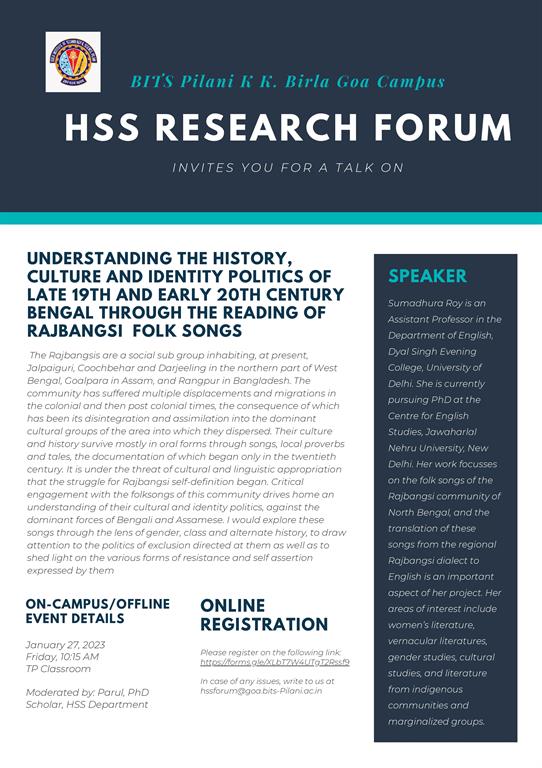
-------------------------------------------------------------------------------------------------------------------------------------------
"Remembering the 1947 Bengal Partition: Narration, Representation and Contestation "
Talk by Dr Sumallya Mukhopadhyay, Assistant Curator of Oral History, The Partition Museum, Delhi
DATE: 10th December,2022 VENUE:TP classroom, BITS GOA CAMPUS TIME: 10:30 AM
The Partition of India left deep wounds to be tended to by the generations that came afterwards. In West Bengal, multiple waves of settler migration changed the landscape of labour, representation and identity formation. This lecture will employ Mikhail Bakhtin's concept of polyphony to read into the oral narratives of refugees residing in refugee camps, refugee colonies and government-sponsored settlements between the years of 1947 and 1970, in West Bengal. It will argue that the refugees are enterprising individuals who have made a life for themselves in their new-found social locations yet have to deal with memories of dispossession, migration and resettlement. It will look at the oral history interviews as a performative embodiment of their life stories and present an alternative picture of the East Pakistani refugee experience in the wake of the 1947 Bengal Partition.

-------------------------------------------------------------------------------------------------------------------------------------------
"On Ethnography"
Talk by Rajesh Dev teaches political science at the University of Delhi with research interests in the areas of anthropology of law, state, and policy, politics of identity and the politics of the Himalayan region.
DATE: 2nd December,2022 VENUE:TP classroom, BITS GOA CAMPUS TIME: 10:15 AM
This talk is intended to initiate researchers to ethnography as an approach to interpreting and explaining the lived experiences of the political. It aims to help us understand "what" an ethnographic exercise entails and "how" ethnography, through a "thick description" of the "processes, causes and effects", pluralizes our more formal understanding and experiences of the political. It will explain why ethnography is better suited to experience and unravel the complex, real-world of "small-p" politics.
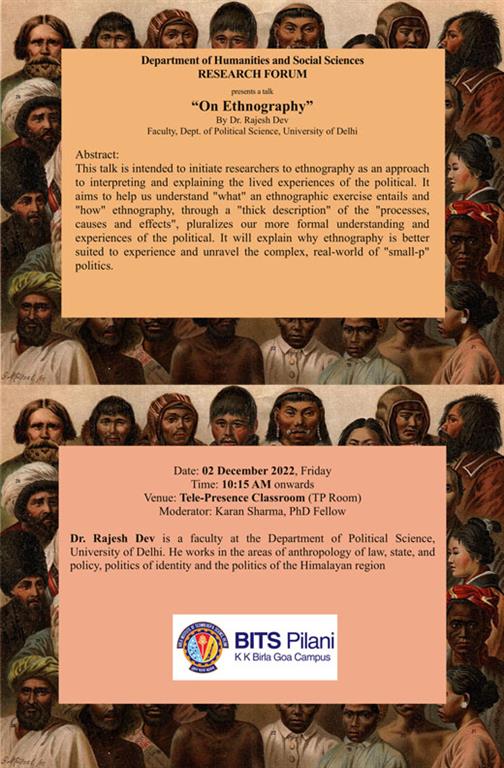
-------------------------------------------------------------------------------------------------------------------------------------------
'The Shudra'
Talk by Mr. Sumant Harshvardhan, a PhD scholar
DATE:25th November, 2022 VENUE:A-508, BITS GOA CAMPUS TIME: 10:15 AM Discussing Jalalul Haq's book 'The Shudra'
-------------------------------------------------------------------------------------------------------------------------------------------
"Three decades of monitoring of 50 Ha forest plot in Mudumalai National Park: implications for monitoring of forests in Goa's Western Ghats"
Talk by Dr. H.S.Suresh, Centre for Ecological Sciences & Divecha Centre for Climate Change, IISc, Bangalore .
DATE:18th October, 2022 VENUE:A-502, BITS GOA CAMPUS TIME:4:00 P.M
Abstract
A 50-hectare large permanent forest plot was established in the dry forests of Mudumalai Tiger Reserve during 1988-89 to understand the dynamics of the dry forests with respect to annual dry season fire, herbivory by large mammals and inter-annual variability in climate. All woody individuals >1 cm dbh were identified, measured for size, and mapped for spatial position. Annual census for mortality and recruitment was carried out and sizes of all surviving individuals were measured for size once in four years.
Plot had 26000 individuals belonging to 72 species during the first census. Population of the plot showed considerable fluctuations across the years. Current standing population is over 55,000 with 84 species. Most species have shown considerable fluctuation in the population, the most interesting pattern was seen in an understory shrub Helicteres isora. Mortality was largely in smaller sized individuals while there was a lag mortality observed with individuals over 10 cm dbh. Recruitment was largely through vegetative coppicing and confined to few species. Most abundant species such as Anogeissus latifolia and Terminalia crenulata did not show recruitment. With all the factors affecting the population dynamics, there was overall increase in the biomass largely due to the growth and hence the carbon sequestration.
We are also conducting similar studies across the rainfall gradient by establishing 19 one-hectare plots. We are also mapping the extent of dry season fires throughout the reserve. Other long-term studies include phenology, invasive species and monitoring elephant populations that impact the vegetation.
This talk will sum up our experience working in Mudumalai and talk about possibilities of long term forest monitoring in Goa's Western Ghats
-------------------------------------------------------------------------------------------------------------------------------------------
"The Jati and its Children: Orphanages as Sites of Contestation"
Speaker: Dr Soni Postdoctoral Fellow, IIT Bombay DATE: 14th October, 2022 VENUE:A-605, BITS GOA CAMPUS TIME: 10:15 AM
A talk by Dr Soni. She completed her PhD at the Institute of History, ETH Zurich. Her research interests are Childhood and youth, gender, colonial and postcolonial history. She delivered a talk titled, “The Jati and its Children: Orphanages as sites of contestation” which is part of the tentative book chapter she is working on. The talk was delivered in a hybrid mode with faculties, research scholars and students from the institute joining offline and a handful of others from different departments and institutes participating online. Hajara Abdul Hameed, PhD Scholar from the department was the event moderator.
The talk was on the famine orphans in India from mid-19th to the 20 th century. She discussed how the famine orphans had become a site of socio-political and economic contestations. The notion of “Jati” id the analytical framework for her paper. The non-state actors like Arya Samaj,Sanatan Dharmis, Anjuman-i-Himayat-i-Islam and other charitable individuals, their rise, evolution and history were discussed in detail. The talk contented that the famine orphan issue was important in defending one’s sense of Jati with all its multilayered meaning. The talk consisted of three major sessions:1) famine orphans, 2) Rise of Arya Samaj,3) Actors outside the Hindu Jati. She also delineated that the efforts of these initiatives were rooted in the notion of nation-building. The talk was followed by discussions with the participants.
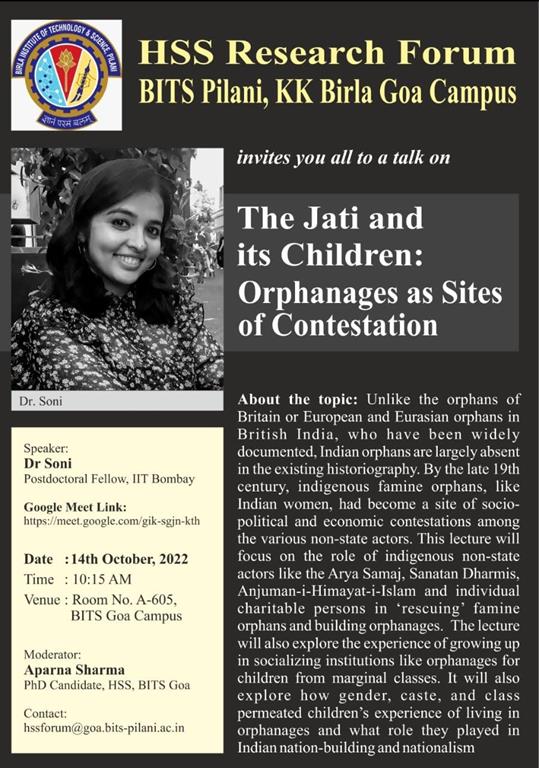
-------------------------------------------------------------------------------------------------------------------------------------------
"A Talk on Nietzsche's Nagnum Opus " The Genealogy of Morals" The discussion would be led by Mr. Karan Sharma, a Ph.D. research scholar at the Department of Humanities and Social Sciences, BITS Pilani Goa.
DATE: 30th September, 2022 VENUE:A-605, BITS GOA CAMPUS TIME: 11:00 Am
